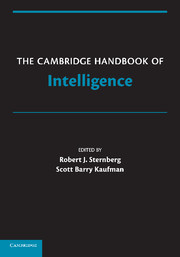Book contents
- The Cambridge Handbook of Intelligence
- The Cambridge Handbook of Intelligence
- Copyright page
- Dedication
- Contents
- Contributors
- Preface
- Part I Intelligence and Its Measurement
- Part II Development of Intelligence
- Part III Intelligence and Group Differences
- Part IV Biology of Intelligence
- Part V Intelligence and Information Processing
- Chapter 19 Basic Processes of Intelligence
- Chapter 20 Working Memory and Intelligence
- Chapter 21 Intelligence and Reasoning
- Chapter 22 Intelligence and the Cognitive Unconscious
- Chapter 23 Artificial Intelligence
- Part VI Kinds of Intelligence
- Part VII Intelligence and Society
- Part VIII Intelligence in Relation to Allied Constructs
- Part IX Moving Forward
- Author Index
- Subject Index
Chapter 20 - Working Memory and Intelligence
from Part V - Intelligence and Information Processing
Published online by Cambridge University Press: 05 June 2012
- The Cambridge Handbook of Intelligence
- The Cambridge Handbook of Intelligence
- Copyright page
- Dedication
- Contents
- Contributors
- Preface
- Part I Intelligence and Its Measurement
- Part II Development of Intelligence
- Part III Intelligence and Group Differences
- Part IV Biology of Intelligence
- Part V Intelligence and Information Processing
- Chapter 19 Basic Processes of Intelligence
- Chapter 20 Working Memory and Intelligence
- Chapter 21 Intelligence and Reasoning
- Chapter 22 Intelligence and the Cognitive Unconscious
- Chapter 23 Artificial Intelligence
- Part VI Kinds of Intelligence
- Part VII Intelligence and Society
- Part VIII Intelligence in Relation to Allied Constructs
- Part IX Moving Forward
- Author Index
- Subject Index
Summary
Keywords
Information
- Type
- Chapter
- Information
- The Cambridge Handbook of Intelligence , pp. 394 - 418Publisher: Cambridge University PressPrint publication year: 2011
Accessibility standard: Unknown
Why this information is here
This section outlines the accessibility features of this content - including support for screen readers, full keyboard navigation and high-contrast display options. This may not be relevant for you.Accessibility Information
- 15
- Cited by
